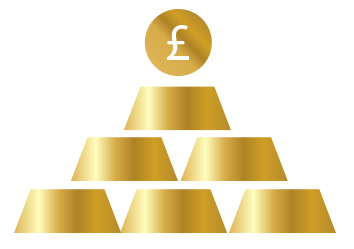
The Basel Accords are a testament to the scale of the damage done by the global financial crisis over a decade ago. The Basel Committee on Banking Supervision, a supergroup representing the economic interests of the G20 as well as major banking hotspots globally, is keen for nations and banks to prevent such an economic calamity occurring again.
To do so, the Committee has proposed reforms which they recommend should be made to curb the excesses of the banking sector, reducing risk and protecting the wealth of people all over the world. Basel III, the third raft of recommendations from the Committee, is generating much buzz in the gold markets, all because it could fundamentally change the way gold is viewed as an asset.
Echoes of the old crisis
The scars of the 2008 financial crisis run deep. The likes of Lehman Brothers went from seemingly impregnable financial institutions to next to nothing in mere days, causing wealth to evaporate and the economic fortunes of many to dwindle. Banks took on riskier bets and found new and questionable ways to make higher profits.
Bubbles formed in Dot Com businesses and then the money moved into housing, aided and abetted by instruments such as sub-prime loans. By the time the extent of malinvestment was uncovered, the bubble was already bursting, and by 2009, bailouts became necessary to prevent a new Great Depression from occurring.
The Basel Committee wishes to avert this from happening again, so the Basel Accords focus on issues such as the way banks structure their balance sheets and assets. Originally agreed upon back in 2010, Basel III was supposed to have been fully implemented on several occasions, but the deadline has been continuously rolled back. That could all change, as many changes are expected to become enshrined in Europe from June 2021 onwards, with a final implementation deadline pencilled in for January 2023.
You might be wondering, however, what does this have to do with gold? When banks make investments to drive profits, precious metals such as gold are often a popular choice. Banks might facilitate the transaction of gold for customers or simply buy into the market for their own ends. However, the way in which banks have chosen to do so has left the market skewed enormously in favour of paper gold contracts instead of the real thing.
Allocated precious metals are those which you can clearly identify as physical gold items which you may own, which your bank may be storing until you ask to withdraw them. The bank is in no position to claim ownership of the item, nor can they list them as assets or liabilities owed to the customer. Unallocated precious metals, however, allow banks to turn customers into unsecured creditors, so you might not necessarily claim ownership of a clearly identifiable gold bar or coin.
The bank, in the meantime, could be sitting on a stock of unallocated gold coins or bars, holding them as their own assets, while offsetting them by recording a liability to the customer for the value of the asset they have.
Just a load of paper
The system might sound simple, but there’s a clear issue at stake. Banks holding unallocated precious metals might only expect to have to provide so much of the gold they carry, but certainly couldn’t sustain a rush of all customers wanting to withdraw their gold all at the same time. Just as with a bank run, such an occurrence would mean calamity for a bank, as they wouldn’t have the means to make good on their customers’ requirements.
The large amount of unallocated precious metals swirling inside the banking system poses a serious risk to financial health of the global economy, and Basel III intends to reclassify physical gold as a Tier One asset. However, banks would also be expected to back up the assets they claim to have with proper reserves. Paper gold would not be considered a Tier One asset, as it would not count as something tangible or physical.
When Basel III is ultimately implemented, an increasing number of banks could face an unenviable position. Much of the gold transactions banks make exist in this large paper gold universe, but Basel III could force them to either find a way of increasing shareholder equity to generate the cash required to back up their assets or do something even more drastic: exit the paper gold world entirely and opt for physical gold or some other source of reserves.
Physical gold could become a whole lot more valuable as a result. No longer would the price be depressed by the artificially high amount of paper contracts despite a low supply of physical gold. Basel III could represent a real shake-up for banks, forcing them to ditch paper gold for good, and embrace something that physical gold enthusiasts have been keen to get their hands on all along.
While we can’t be sure precisely how gold might be repriced as Basel III comes into force over time, demand for physical gold could begin to mount quite suddenly, and unless we magically discover an equal amount of gold to offset the demand surge, supply could be squeezed and prices may rise. At present, gold prices are dipping after a stellar performance during the earlier surges in the COVID-19 pandemic in 2020. Basel III could be the catalyst for a future price rally to new all-time highs, as the pandemic continues to remain a clear and present danger in many countries.
Keen to explore what the world of physical gold has to offer? The Gold Bullion Company are experts in sourcing valuable gold, silver, platinum and palladium items. Get ahead of the crowd before a new gold rush occurs due to Basel III implementation. Give us a call on 01902 623 259 today to get started.















